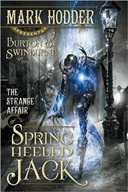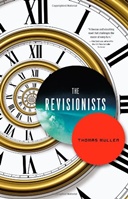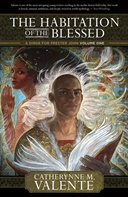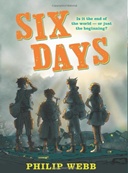“It’s not me but the world that’s deranged. At some point in time, the world I knew either vanished or withdrew, and another world came to take its place. Like the switching of a track. In other words, my mind, here and now, belongs to the world that was, but the world itself has already changed into something else.” — Haruki Murakami, 1Q84
 |
The Strange Affair of Spring Heeled Jack by Mark Hodder I read The Strange Affair of Spring Heeled Jack on the recommendation of a friend who is into steampunk and “bizarro world” novels. So far I’ve taken a pass on bizarro world, but I do read some steampunk. My preference in steampunk novels is for those that teach us about human nature and the alternate timeline that branched off to become our own; I’m thinking particularly about China Miéville’s Perdido Street Station or Dexter Palmer’s The Dream of Perpetual Motion. Novels such as George Mann’s The Affinity Bridge, which are mere hugger-mugger with clanking machines as a backdrop, are just silly, clearly written to cash in on the popularity of the genre. I haven’t made up my mind about Mark Hodder’s debut novel. Does it have something to say or is it merely a mush of overcooked Sherlock Holmes and Jules Verne? Certainly it tastes mighty like the latter, but I’ll give it this: Hodder writes with an infectious energy and he pulls you along with him into this unlikely version of Victorian London. The storyline is quite involved, with threads leading everywhere, but also so preposterous you can’t take any of it seriously. And if Hodder intended his historical figures (Sir Richard Burton, Oscar Wilde, etc) to bear some resemblance to life, he surely blew it with Charles Darwin, a man of whom I know something. Truth be told, when I met Hodder’s Darwin, I nearly threw the book across the room. Still, there are rewards. Hodder’s a good writer, and I enjoyed his imagination. I just don’t think I learned anything, and I’m enough of a snob still to think a good book should educate, or at least make us think.
|
 |
11/22/63 by Stephen King This is the most engaging Stephen King novel I’ve read in years; even so I wrestled with how high to rate it. King is a fine storyteller with some bad habits: in this case excessive length, overuse of narrative tricks, and frequent excursions into irrelevant detail.Spoiler alert: the story is reasonably simple: a contemporary man finds a portal to 1958 and decides to stay a while in order to prevent JFK’s assassination. Once he’s in the past he decides to rectify a couple of other past crimes. He falls in love with a woman. The past, almost supernaturally, fights his every attempt to change it. Upon his return to 2011, he finds the consequences of altering the past to be vast and severe. It’s a hell of a story and it pulled me right along. Could it have been told in 400 pages rather than nearly 700? Yes, but unlike other Stephen King novels I’ve grimly waded through, the length here didn’t bother me all that much (it probably helped that I had just finished a Haruki Murakami novel that weighed in at nearly 1000 pages). What did irritate me was King’s never-ending delight in pointing out the lower prices that prevailed in the 1950s and 60s. You can’t go three pages without finding King’s character Jake marveling over the cost of gas, cars, guns, clothing, medical care, or food. You know, Stephen, we get it. We got it in the first chapter; we don’t need to have our noses rubbed in it all the way through chapter eleventy-seven. And in any case, aren’t prices generally relative to prevailing wages? Jake gets a job and earns mid-20th century wages: surely a quart of 1960 milk would put just a big a dent in his wallet as one from 2011? King’s other irritating habit is his fascination with brand names, titles of TV shows, and names of popular songs. Some of this helps us relate to the late 50s and early 60s , but King overdoes it. Now I’ve got all that out of my system, I loved King’s take on time travel. Speculating on the consequences of altering the past has been a trope of science fiction since, oh, I don’t know, forever, but King digs into it with a fresh and enthusiastic perspective, with butterfly effects, harmonics, and the past’s stubborn and eerie resistance to change. He puts all these things into the context of the story as action elements … no as a dry theoretical discussion but rather as things that are happening to Jake in the here and now. The chilling last chapter, when Jake returns to the horrifyingly altered 2011, may be short and sweet, but it’s no throwaway effort to wrap up the book … I thought it was the scariest part of all, and I think King put a lot of thought into it. The love story at the center of the novel is pretty well done, not at all characteristic of King’s other novels. Both Jake and Sadie are memorable characters on their own, not just foils to help King move the story along. This is a very good Stephen King novel, certainly one of the best he’s written. If you’ve given up on King, come back for this one. If you’ve never read King, start with this one. If you’re interested in time travel stories, you’ll love 11/22/63.
|
 |
The Revisionists by Thomas Mullen Another interesting time-travel story; unlike Jake in King’s 11/22/63, the protagonist in this one travels from the future back to our time, and the novel is less concerned with time travel per se than with the present you and I live in. Spoiler alert: a “protector,” an operative of a future government’s security services, is sent back to present-day Washington DC to ensure that various calamitous events leading to a worldwide conflagration occur on schedule, thereby ensuring the future he comes from remains unaltered. You see, other forces from the future are sending back operatives who have a different mission: to undo key events, prevent the conflagration, and make a different future. The glimpses we get of the future society are disturbing, and it is hard to believe anyone living in it wouldn’t want to see it changed, even if it meant their grandparents had never met and they no longer existed … the future sounds like present-day North Korea. But our operative, Z, is determined to do his job and do it well … until he begins to get involved with the contemps (i.e., us). The story is told by Z and three present-day Washingtonians. The contemps are important if unknowing actors in the key events the future government wants to protect. As Z gets more and more involved with them, he begins to doubt the importance of what he’s doing, and to understand why others from his time time want to change the past. We never find out whether Z and the other agents protect or change the future, and that’s okay. The interesting action is what’s happening today, with a burgeoning number of essentially uncontrolled and lawless clandestine contractor security firms operating in American society, spying on domestic citizens with impunity, all under the guise of the Patriot Act and the “war on terror.” Really, the novel is about what’s going on now, and its grim hints of a totalitarian future are a warning that if we don’t stop these security excesses we are going to get exactly that future, because power loves nothing more than looking out for itself, and, as George Carlin would say, it doesn’t give a shit about you or me, never mind life, liberty, and the pursuit of happiness. That’s not to say the science fiction angle to the story is slighted. In fact, the more you realize the pickle Z is in, the more you begin to suspect his future masters sent him back in order to cause the events leading to the conflagration that makes their future totalitarian society possible … he’s meant to be expendable, but damn it takes him a while to figure that out! The Revisionists is an involving and exciting read, right up to the last few pages, where it inexplicably begins to drag: the death of one of the contemps, Leo, goes on for several maudlin pages, and for some reason the author insists on giving us what turns out to be rather boring romantic closure between Z and the contemp Tasha. Frankly, I thought the romance between Z and Tasha detracted from the story, as did Tasha’s quest to find out more about her brother, killed in action in Afghanistan (his story, when Tasha finally uncovers it, is even more mundane and unsatisfying … you wonder why Mullen bothered to include it in the novel). These are minor quibbles. I quite enjoyed the book, and if Mullen’s intent was to make readers sit up and take notice of the out-of-control growth of the domestic American security apparatus, he succeeds in a most gripping way.
|
 |
1Q84 by Haruki Murakami Quite an interesting novel, and a more than normally playful one for Murakami. It’s an adult fairy tale, and a playful one at that, on the order of a Neil Gaiman fantasy. Still, 1Q84 is undoubtedly Murakami, right down to the sexually ambiguous relationship between a 30-something man and a teenaged girl (a far less ambiguous relationship, actually, than the one in The Wind-Up Bird Chronicle). My general reaction is that this is not Murakami’s finest work. It’s overlong (925 pages) and could have been told more forcefully (and just as evocatively) in half the number of pages. Repetition, past a certain point, becomes Murakami’s enemy: characters ponder the same thoughts again and again, restate other characters’ statements and questions, and recycle entire conversations from earlier chapters … sometimes word for word. Murakami’s fantasy … the divergent worlds, the little people, the air chrysalides (yes, I looked up the plural of chrysalis), the dhotas and mazas … is a rich one, and unlike the bits of magical realism Murakami inserted into The Wind-Up Bird Chronicle, absolutely central to the story. Because the fantasy is so central to the story, it’s frustrating that Murakami leaves so many parts of it unexplored: I finished the novel with more questions than answers. Threads are unconnected, the fates of important characters are left hanging, conflicts are unresolved. There are so many other things I want to say, but they are all spoilers, best left unsaid in a short review. 1Q84 is good, very good, but it could have been so much better.
|
 |
The Habitation of the Blessed by Catherynne Valente A few years ago, reading about the Lewis and Clark expedition, I was surprised to learn that Thomas Jefferson believed the Corps of Discovery would find, among other wonders in the then-unknown western reaches of America, a race of headless people with faces on their chests. I now know, thanks to Catherynne Valente’s The Habitation of the Blessed, that this (along with the Fountain of Youth and other marvels) was a lingering hangover of the medieval Prester John myth, transplanted from 13th century Europe to 18th century America. The Habitation of the Blessed is a fantasy based on the Prester John myth. Told by a 17th century monk in a series of letters sent back to his monastery in Switzerland, quoting extensively from texts found growing on a magical tree, it is the tale of the kingdom of Prester John, as inaccessible and lost as Atlantis. Populated by headless people with faces on their chests, people with giant hands or ears, pygmies who mate with human-sized cranes, people with the heads of swans (descendents of Leda), and talking tigers and lions, it is a remarkable place … literally a fabulous place, a place where fables are true. In this land, people drink from the Fountain of Youth and stay 30 years old forever. In this land, sand and rock flow like water. In this land, people switch roles, husbands, wives, and children every three centuries, just to stir things up. And so on. Pure fantasy rather leaves me cold, so I was not terribly interested in sticking around to see what happened … by the book’s halfway point I didn’t sense any sort of relatable human crisis in the making, or even much of a story, nothing to really hold my interest. But the real problem for me was Catherynne Valente’s characters, who all think and talk the same. Valente’s fantasy reminded me of those medieval bestiaries where elephants, lions, and griffons looked like horses and dogs because those were the only animals the artists had ever actually seen. Same thing here: the monk, Prester John, his wife, the long-eared sprite who raises a queen’s giant-handed children … they all sound alike, pretty much just like us. Catherynne Valente has a great idea, and I loved learning more about the Prester John legend and the strength of its hold the human mind from the times of the Crusades right up to modern times, but the story needs a teller who can make it convincing, who can relate it to the lives we live in this world.
|
 |
Six Days by Philip Webb Six Days is an exciting, fast read, a young adult science fiction adventure set in a post-apocalyptic world. My standard for post-apoclyptic young adult science fiction, unfortunately, has been set very high: ever since I read Paolo Bacigalupi’s Ship Breaker I’ve had a hard time settling for anything less. Six Days suffers greviously in comparison. My central problem with Six Days is the speed and ease with which the main character, Cass, adapts to an entirely new and virtually magical world of futuristic technology and interstellar travel. She comes from nothing … a peasant, basically, with no education, living a life of back-breaking manual labor with no hope for the future … and yet she steps into an incredible new world with barely a pause to say “gee whiz.” Instantly and with no preparation she grasps it all and outwits the best minds the future can throw at her. It’s so unbelievable you simply have to read it as a fairy tale, not as science fiction. The other characters … her father, her brother, the two emissaries from outer space, the occupying Vlads … are cardboard cutouts. In spite of the story’s weaknesses, it’s a ripping yarn, hard to put down. I breezed through its 350+ pages in no time at all … but I learned nothing from it and by tomorrow will have forgotten all about it. Six Days would have been happier as a manga comic book.
|